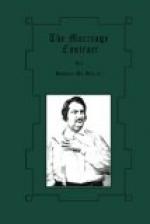“Yes, and now separated in body,” said Paul.
“Ah!” exclaimed the old man.
“Oh! against my wife’s will,” added the count, hastily. “I was forced to deceive her; she did not know that I was leaving her.”
“You have left her?”
“My passage is taken; I sail for Calcutta on the ‘Belle-Amelie.’”
“Two day’s hence!” cried the notary. “Then, Monsieur le comte, we shall never meet again.”
“You are only seventy-three, my dear Mathias, and you have the gout, the brevet of old age. When I return I shall find you still afoot. Your good head and heart will be as sound as ever, and you will help me to reconstruct what is now a shaken edifice. I intend to make a noble fortune in seven years. I shall be only forty on my return. All is still possible at that age.”
“You?” said Mathias, with a gesture of amazement,—you, Monsieur le comte, to undertake commerce! How can you even think of it?”
“I am no longer Monsieur le comte, dear Mathias. My passage is taken under the name of Camille, one of my mother’s baptismal names. I have acquirements which will enable me to make my fortune otherwise than in business. Commerce, at any rate, will be only my final chance. I start with a sum in hand sufficient for the redemption of my future on a large scale.”
“Where is that money?”
“A friend is to send it to me.”
The old man dropped his fork as he heard the word “friend,” not in surprise, not scoffingly, but in grief; his look and manner expressed the pain he felt in finding Paul under the influence of a deceitful illusion; his practised eye fathomed a gulf where the count saw nothing but solid ground.
“I have been fifty years in the notariat,” he said, “and I never yet knew a ruined man whose friend would lend him money.”
“You don’t know de Marsay. I am certain that he has sold out some of his investments already, and to-morrow you will receive from him a bill of exchange for one hundred and fifty thousand francs.”
“I hope I may. If that be so, cannot your friend settle your difficulties here? You could live quietly at Lanstrac for five or six years on your wife’s income, and so recover yourself.”
“No assignment or economy on my part could pay off fifteen hundred thousand francs of debt, in which my wife is involved to the amount of five hundred and fifty thousand.”




